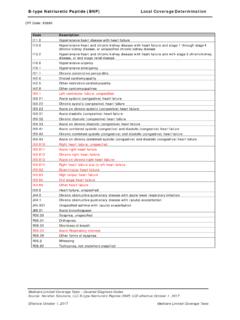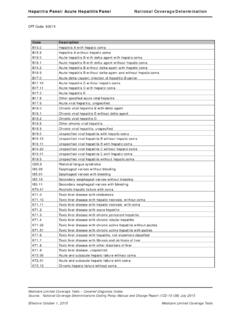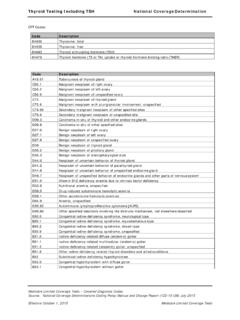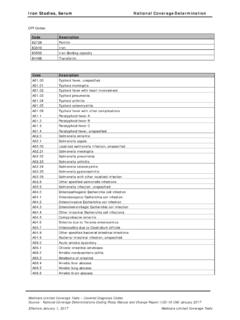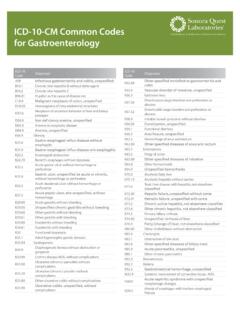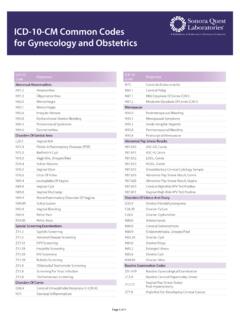Transcription of Medicare Limited Coverage Policies Table of Contents ...
1 I Medicare Limited Coverage Policies Table of Contents Effective October 2019 This information is meant only as a guide. Please refer to the Center for Medicare & Medicaid Services (CMS) at or Noridian Medicare at for the most up-to-date Policies . You may also visit for electronic/printer-friendly versions of these Policies . Test Name CPT Code(s) Pages National Coverage Determination Policies Alpha-fetoprotein 82105 1-2 Blood Counts (CBC) 85004, 85007-8, 85013-14, 85018, 85025, 85027, 85032, 85048, 85049 3-6 Blood Glucose Testing 82947, 82948, 82962 7-8 Carcinoembryonic Antigen (CEA)
2 82378 9-10 Collagen Crosslinks 82523 11-12 Cytogenetic Studies 88230, 88235, 88237, 88249, 88262, 88263, 88264, 88269, 88271, 88273, 88274, 88275, 88280, 88289, 88291 13-14 Digoxin Therapeutic Drug Assay 80162 15-16 Fecal Occult Blood Test 82272 17-18 Gamma Glutamyl Transferase 82977 19-20 Glycated Hemoglobin/Glycated Protein 82985, 83036 21-22 Hepatitis Panel/Acute Hepatitis Panel 80074 23-24 Histocompatibility Testing 86812, 86816 25-26 Human Chorionic Gonadotropin Quantitative 84702 27-28 HIV Testing (Prognosis including monitoring) 87536, 87539 29-30 Human Immunodeficiency Virus (HIV) Testing (Diagnosis) 86689, 86701, 86702, 86703, 87390, 87391, 87534, 87535, 87537, 87538 31-34 Lipid Testing 80061, 82465, 83700, 83701, 83704, 83718, 83721, 84478 35-38 Partial Thromboplastin Time (PTT) 85730 39-40 Prostate Specific Antigen 84153 41-42 Prothrombin Time (PT) 85610 43-46 Serum Iron Studies 82728, 83540, 83550, 84466 47-50 Thyroid Testing 84436, 84439, 84443, 84479 51-52 Tumor Antigen by Immunoassay CA 15-3/CA 86300 53-54 Tumor Antigen by Immunoassay CA 19-9 86301 55-56 Tumor Antigen by Immunoassay CA 125 86304 57-58 Urine Culture, Bacterial 87086, 87088 59-60 Non-Covered ICD-10 Codes for all NCDs 61-68 local Coverage Determination Policies B-type natriuretic Peptide (BNP)
3 Testing 83880 69-70 Controlled Substance Monitoring and Drugs of Abuse Testing 80305, 80306, 80307, G0480, G0481, G0482, G0483, G0659 71-82 Flow Cytometry 88182, 88184, 88185, 88187, 88188, 88189, 86355, 86356, 86357, 86359, 86360, 86361, 86367 83-88 Helicobacter Pylori Infection Testing 83013, 83014, 87338 89-92 Serum Magnesium 83735 93-94 Vitamin D Assay-Dihydroxy 82652 95-96 Vitamin D Assay-Hydroxy 82306 97-98 Medicare National Coverage DeterminationPolicyAlpha-fetoproteinCPT: 82105 Medically Supportive ICD Codesarelisted on subsequent page(s) of this documentCMS National CoveragePolicyCoverage Indications, Limitations, and/or MedicalNecessityAlpha-fetoprotein (AFP) is a polysaccharide found in some carcinomas. It is effective as a biochemical marker for monitoring the response of certain malignancies is useful for the diagnosis of hepatocellular carcinoma in high-risk patients (such as alcoholic cirrhosis, cirrhosis of viral etiology, hemochromatosis, and alpha 1-antitrypsin deficiency)
4 And in separating patients with benign hepatocellular neoplasms or metastases from those with hepatocellular carcinoma and, as a non-specific tumor associated antigen, serves in marking germ cell neoplasms of the testis, ovary, retro peritoneum, viewcurrentlimitedcoveragetests,referenc e guides, and policy view the complete policy and the full list of medically supportive codes, please refer to the CMS website 1 CodeDescriptionMedicare National Coverage DeterminationPolicyThe ICD10 codes listed below are the top diagnosis codes currently utilized by ordering physicians for the Limited Coverage test highlighted above that are also listed as medically supportive under Medicare s Limited Coverage policy. If you are ordering this test for diagnostic reasons that are not covered under Medicare policy, an Advance Beneficiary Notice form isrequired.
5 *Note Bolded diagnoses below have the highestutilizationDisclaimer:This diagnosis code reference guide is provided as an aid to physicians and office staff in determining when an ABN (Advance Beneficiary Notice) is necessary. Diagnosis codes must be applicable to the patient s symptoms or conditions and must be consistent with documentation in the patient s medical record. Sonora Quest Laboratories does not recommend any diagnosis codes and will only submit diagnosis information provided to us by the ordering physician or his/her designated staff. The CPT codes provided are based on AMA guidelines and are for informational purposes codingis thesoleresponsibility of thebillingparty. Please directany questions regardingcodingto the payer being view current Limited Coverage tests, reference guides, and view the complete policy and the full list of medically supportive codes, please refer to the CMS Quest Laboratories, any associated logos, and all associated Sonora Quest Laboratories registered or unregistered trademarks are the property of Sonora Quest Laboratories.
6 Allthird-partymarks and are the property of theirrespective owners. 2019 Sonora Quest Laboratories. All viral hepatitis B without delta-agent Chronic viral hepatitisCLiver cellcarcinomaIntrahepatic bile ductcarcinomaMalignant neoplasm of liver, primary, unspecified as totypeMalignant neoplasm of liver, not specified as primary or secondary Malignant neoplasm of unspecified testis, unspecified whether descended or undescendedMixedhyperlipidemiaHereditary hemochromatosis Hemochromatosis, unspecifiedAlcoholic cirrhosis of liver withoutascitesAlcoholic cirrhosis of liver withascitesHepatic fibrosisUnspecified cirrhosis of liver Other cirrhosis of liverAutoimmune hepatitisAbnormal findings on diagnostic imaging of liver and biliarytractAbnormal findings on diagnostic imaging of other abdominal regions.
7 Including retroperitoneumAbnormal findings on diagnostic imaging of other specified body structuresOther abnormal tumormarkersPlease refer to the Limitations or Utilization Guidelines section on previous page(s) for updated:10/01/19 Alpha- 2 CPT: Medicare National Coverage Determination PolicyCMS National Coverage PolicyMedically Supportive ICD Codes are listed on subsequent page(s) of this view current Limited Coverage tests, reference guides, and policy view the complete policy and the full list of medically supportive codes, please refer to the CMS website reference85004, 85007, 85008, 85013 , 85014, 85018, 85025, 85027, 85032, 85048, 85049 Blood CountsCBCC overage Indications, Limitations, and/or Medical NecessityBlood counts are used to evaluate and diagnose diseases relating to abnormalities of the blood or bone marrow.
8 These include primary disorders such as anemia, leukemia, polycythemia, thrombocytosis and thrombocytopenia. Many other conditions secondarily affect the blood or bone marrow, including reaction to inflammation and infections, coagulopathies, neoplasms and exposure to toxic substances. Many treatments and therapies affect the blood or bone marrow, and blood counts may be used to monitor treatment complete blood count (CBC) includes a hemogramand differential white blood count (WBC). The hemogramincludes enumeration of red blood cells, white blood cells, and platelets, as well as the determination of hemoglobin, hematocrit, and symptoms of hematological disorders are often nonspecific, and are commonly encountered in patients who may or may not proveto have a disorder of the blood or bone marrow.
9 Furthermore, many medical conditions that are not primarily due to abnormalities of blood or bone marrow may have hematological manifestations that result from the disease or its treatment. As a result, the CBC is one of the most commonly indicated laboratory patients with possible hematological abnormalities, it may be necessary to determine the hemoglobin and hematocrit, to calculate the red cell indices, and to measure the concentration of white blood cells and platelets. These measurements are usually performed on a multichannel analyzer that measures all of the parameters on every sample. Therefore, laboratory assessments routinely include these for a CBC or hemograminclude red cell, platelet, and white cell disorders. Examples of these indications are enumerated individually for a CBC generally include the evaluation of bone marrow dysfunction as a result of neoplasms, therapeutic agents,exposure to toxic substances, or pregnancy.
10 The CBC is also useful in assessing peripheral destruction of blood cells, suspectedbone marrow failure or bone marrow infiltrate, suspected myeloproliferative, myelodysplastic, or lymphoproliferative processes,and immune for hemogramor CBC related to red cell (RBC) parameters of the hemograminclude signs, symptoms, test results,illness, or disease that can be associated with anemia or other red blood cell disorder ( , pallor, weakness, fatigue, weightloss,bleeding, acute injury associated with blood loss or suspected blood loss, abnormal menstrual bleeding, hematuria, hematemesis,hematochezia, positive fecal occult blood test, malnutrition, vitamin deficiency, malabsorption, neuropathy, known malignancy,presence of acute or chronic disease that may have associated anemia, coagulation or hemostatic disorders, postural dizziness,syncope, abdominal pain, change in bowel habits, chronic marrow hypoplasia or decreased RBC production, tachycardia, systolicheart murmur, congestive heart failure, dyspnea, angina.)
